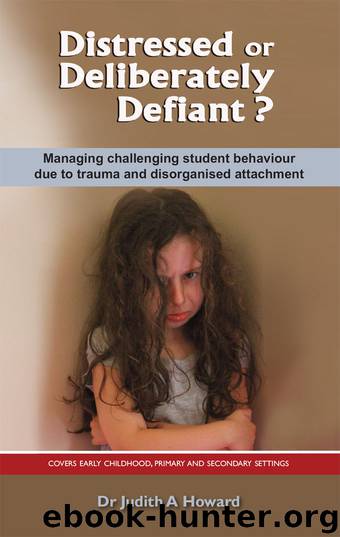Distressed or Deliberately Defiant?: Managing challenging student behaviour due to trauma and disorganised attachment by Howard Judith Dr

Author:Howard, Judith, Dr.
Language: eng
Format: azw3
Publisher: Australian Academic Press
Published: 2013-05-01T04:00:00+00:00
Emotional self-regulation
In addition to issues with relating, students from trauma histories can emotionally dysregulate regularly and most days will involve some form of behavioural outbursts or tantrums. Schools need to develop both proactive and reactive approaches to enhancing the student’s capacity for self-regulation. With the implementation of careful and informed, proactive strategies, students can develop considerable resilience in this area and this can lead to a much reduced frequency of concerning behaviour. However, it is still very likely that, every so often, a significant behavioural outburst will occur and schools need to be ready and able to react in an evidence-based and supportive manner.
During perceived threat and a resultant, significant behaviour event, the student’s endocrine system can excrete too much of two important hormones. The adrenal glands (just above the kidneys) immediately release adrenalin. If the threat is perceived as severe or persists after a couple of minutes, the adrenal glands then release cortisol. Once in the brain, cortisol remains much longer than does adrenalin, where it continues to affect brain cells. Usually, a homeostatic mechanism eventually kicks in and the cortisol reduces. However, in the case of the traumatised student, a chronic oversecretion of these stress hormones can occur, which can adversely affect brain function and can certainly make emotional self-regulation very difficult to achieve. Furthermore, too much cortisol can damage the hippocampus, which is central to learning and memory.
If school personnel intervene with a disciplinary response after a student behavioural outburst, but before allowing time for the cortisol to dissipate, they can be putting themselves, the student and others at risk from a further outburst. It is recommended that at least 30 minutes of low stimulus activity (perhaps colouring in) is provided for younger students and up to an hour or even more for adolescents, before any questioning or behavioural interventions are attempted.
Even then, this must be done in an informed and caring manner that takes into consideration the student’s individual circumstances. School personnel must also consider the impact on the hippocampus and the possibility that the student may not have accurate recall of the details of the behavioural event. This lack of communication and recall can easily be misread as their avoiding discussion or refusing to relay information or, at the worst, blatantly lying, when it may actually be due to confusion and an impaired access to memories.
Download
This site does not store any files on its server. We only index and link to content provided by other sites. Please contact the content providers to delete copyright contents if any and email us, we'll remove relevant links or contents immediately.
| Administration & Medicine Economics | Allied Health Professions |
| Basic Sciences | Dentistry |
| History | Medical Informatics |
| Medicine | Nursing |
| Pharmacology | Psychology |
| Research | Veterinary Medicine |
The Art of Thinking Clearly by Rolf Dobelli(10452)
The 5 Love Languages: The Secret to Love That Lasts by Gary Chapman(9784)
Mindhunter: Inside the FBI's Elite Serial Crime Unit by John E. Douglas & Mark Olshaker(9318)
Becoming Supernatural by Dr. Joe Dispenza(8200)
Nudge - Improving Decisions about Health, Wealth, and Happiness by Thaler Sunstein(7691)
The Road Less Traveled by M. Scott Peck(7594)
Mastermind: How to Think Like Sherlock Holmes by Maria Konnikova(7321)
Enlightenment Now: The Case for Reason, Science, Humanism, and Progress by Steven Pinker(7306)
Win Bigly by Scott Adams(7183)
The Way of Zen by Alan W. Watts(6600)
Factfulness: Ten Reasons We're Wrong About the World – and Why Things Are Better Than You Think by Hans Rosling(4731)
The State of Affairs by Esther Perel(4711)
Gerald's Game by Stephen King(4641)
Man's Search for Meaning by Viktor Frankl(4581)
The Confidence Code by Katty Kay(4251)
Thinking in Bets by Annie Duke(4218)
The Healing Self by Deepak Chopra(3568)
Hidden Persuasion: 33 psychological influence techniques in advertising by Marc Andrews & Matthijs van Leeuwen & Rick van Baaren(3552)
The Worm at the Core by Sheldon Solomon(3485)
